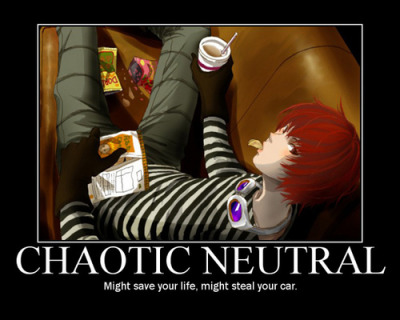This interpretation of the system is workable- and thoughtful- but I find it both a bit over-complicated and both broad and narrow in some ways that I think would frustrate me.
A lawful good character isn't necessarily inclined to abide by long-standing laws that provide for the enslavement or sacrifice of sentient creatures. And I can imagine a chaotic good barbarian who, while seeming completely without respect for authority or discipline, still has a deep respect for the traditions of his native people.
More to the point, some of the most interesting character interactions come from characters who, while similarly aligned, come into conflict through their interpretations of those alignments, or those of allegedly stress-causing conflicts of alignment who find common ground.
I once envisioned a situation in which a member of a party sprains his ankle as they race along the floor of a pit towards the hanging rope from which they can make their escape. The party is pursued by a monster against whom they have less than a 1-in-2 chance of prevailing. The Neutral character yells, "Look, he's done for! We need to get out of here while he's buying us time!" The Lawful Good character concurs: "The good of the party has to come first. I'm sorry he fell, but what good will come of all of us dying?" The Chaotic Good character replies: "Screw that, we're not leaving him!"- and cuts the rope.
I tend to view the Lawful-to-Chaotic axis as more Collective vs. Individual. The Lawful character doesn't necessarily respect local laws (in many versions of AD&D, there were Lawful rogues, thieves, and assassins), but they believe there are probably good reasons that laws, rules, and traditions are in place, that the collective wisdom usually overrules that of the individual, and while they might choose, say, to put the rules of the Guild above the laws those stodgy merchants lobby for, they still might believe there were reasons those rules were put into place. It makes sense in this context for Paladins to be Lawful Good because following the ancient traditions of their order gives them a sense of peace and assurance that the rightness of their action is guided and backed up by long-held wisdom. But even where those traditions didn't provide guidance, the Lawful character would be wondering about what others would make of his actions, if others of his caste or community would do the same in his stead.
Conversely, the Chaotic character is more likely to think of collective wisdom as most likely to come to decisions that are "good enough" at best, and if he comes up with what seems like a good idea despite going against the way things have been done for years, he's probably not going to spend a lot of time wondering why once the idea has cleared his own personal standard. The chaotic is more likely to feel that individual people have worth, but crowds of people quickly become mobs. Just because it worked yesterday doesn't mean it should be done that way tomorrow; what "works" ought to be subject to constant revision.
If the characters aren't leaders, the Lawful one will crave competent leadership; the Chaotic one is going to want proof of that leader's competence every step of the way, if not outright test it.
Neutral characters in the Law-to-Chaos spectrum I largely think of as the "go-along-get-along" types. If the local community is relgious, why of course they're a member- they just never seem to show up for services. They're glad the guard is there when he's protecting their shop, but resentful when he shows up to collect overdue taxes. Yes, it's great that the neighborhood committee expects certain standards to- Oh, I see. I'll get the lawnmower out.
"Good" and "Evil" I tend to think of on a much simpler scale: for what reasons will I harm or kill?
Good: I will fight the lizardmen because their aggression threatens the innocent people of our village!
Neutral: I will fight the lizardmen because they might have good loot I can hock!
Evil: I will fight the lizardmen because I like how the little ones "pop" when you set them on fire!
Now to some extent, it has to be recognized that this also comes down to the particulars of the individual and their culture, nature, and imagination. One "good" person could be a pacifist, another a soldier. One could be a hunter providing for his people, another could be a vegan who would consider harming an animal evil. And, yes, one "good" person could find torture reasonable in an extreme situation, another believe it could never be morally justifiable, and a third deplore it because the information it might reveal is unreliable and it cuts off other options.
A lot of campaigns I've been in define good and evil largely on a personal level. A few things, like dragons or celestial/infernal creatures might be inherently good or evil. But other things could be relative- a cleric of a religion could get a positive reading when casting "detect evil" on a cleric of an opposing religion, even though both religions could be considered "good"- a god of agriculture and harvest butting up against a god of sylvan wilderness, for example.


